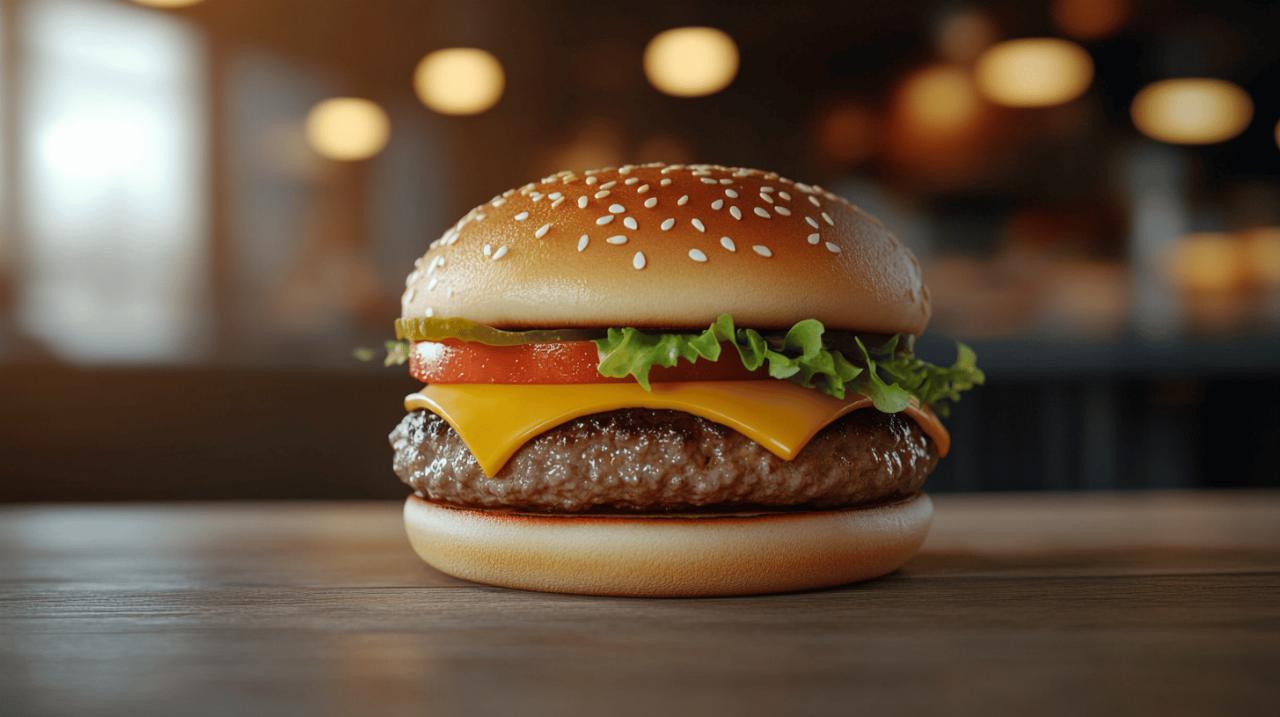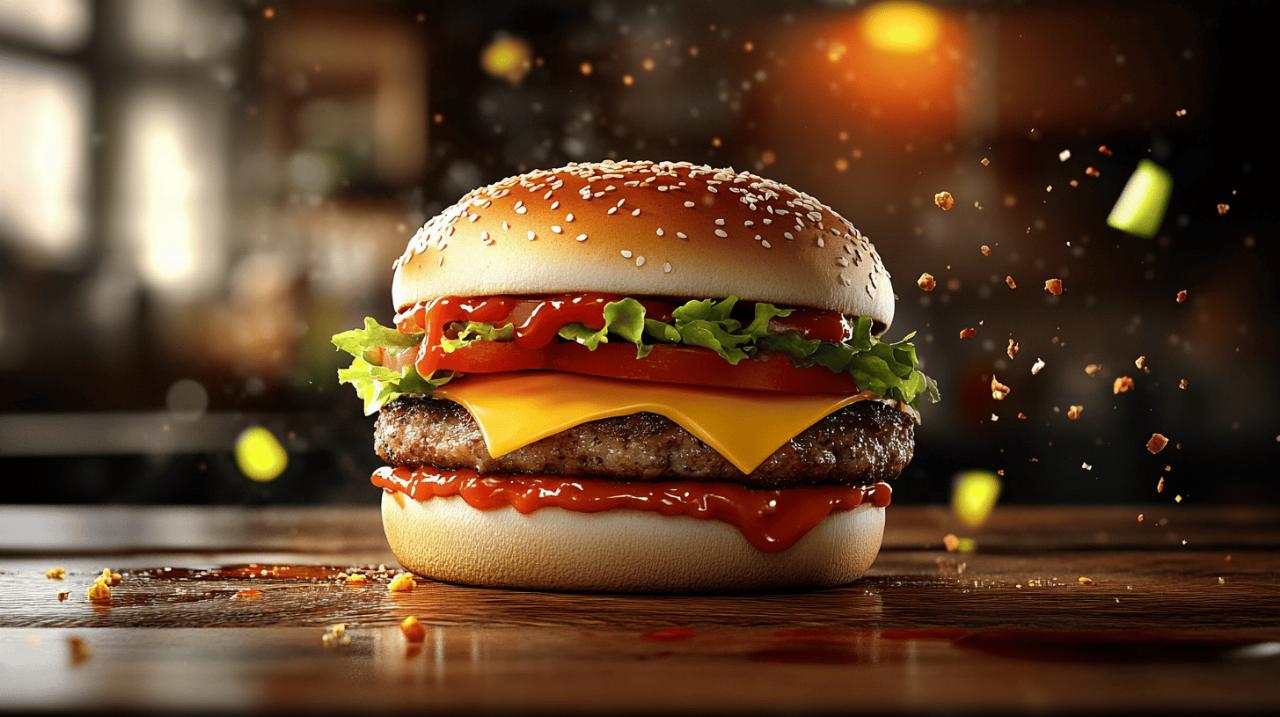Blimey! mcdonald’s cheeseburger calories – the surprising truth about your guilty pleasure
Right then, let's have a chinwag about that cheeky McDonald's Cheeseburger, shall we? It's the sort of treat that pops up in conversations about guilty pleasures, the go-to option when you're peckish and fancy something quick. But what's really going on beneath that golden wrapper? For all the talk of indulgence and fast food faux pas, there's a surprising amount to unpack when it comes to the nutritional profile of this classic offering. Whether you're counting calories, keeping an eye on your waistline, or simply curious about what you're actually tucking into, understanding the facts can help you make smarter choices without giving up the occasional treat altogether.
What's actually lurking inside that golden wrapper?
Breaking Down the Ingredients: More Than Just Beef and Cheese
So, what exactly is in this seemingly innocent offering from McDonald's? At its core, the cheeseburger features a patty made from pure beef, nestled between a soft bun and accompanied by a slice of American cheese. The ensemble is rounded out with the classic condiments: tangy pickles, finely diced onions, a squirt of ketchup, and a dab of mustard. It's a simple recipe, really, but one that's been perfected over decades to deliver that familiar taste. The beef patty itself is straightforward, with no fillers or mysterious additions, which might come as a pleasant surprise to those who imagine fast food as a minefield of unpronounceable ingredients. The cheese, though processed, adds a creamy texture and a mild flavour that complements the savoury beef. Meanwhile, the pickles and onions provide a bit of crunch and acidity, balancing out the richness of the meat and cheese. It's this combination of textures and flavours that makes the cheeseburger such a reliable choice for a quick meal.
The Full Nutritional Lowdown: Calories, Fat, and All the Rest
Now, let's get down to brass tacks. A standard McDonald's Cheeseburger clocks in at three hundred calories, which is relatively modest when you consider some of the heftier items on fast food menus. Breaking it down further, you'll find a mix of macronutrients that includes protein from the beef, carbohydrates from the bun, and fats from both the cheese and the cooking process. While the exact figures for fat and sodium aren't always shouted from the rooftops, it's worth noting that this particular cheeseburger sits comfortably in the middle ground. It's not the leanest option available, but it's far from the most indulgent either. For those mindful of their intake, three hundred calories can fit into a balanced daily diet without causing too much of a stir. Of course, the key is moderation and context. If you're pairing it with a large portion of fries and a sugary drink, the overall meal takes on a different nutritional character. But taken on its own, the cheeseburger is a manageable indulgence that doesn't have to derail your eating plan entirely.
How does it stack up against the mcdonald's menu giants?
Cheeseburger vs big mac: the calorie showdown
Compared to some of its beefier brothers and sisters on the McDonald's menu, like, say, the Big Mac, the cheeseburger seems like the sensible choice. The Big Mac, with its double patties, extra bun layer, and special sauce, naturally packs in more calories and fat. While exact figures vary depending on preparation and regional differences, the gap is noticeable enough to make the humble cheeseburger appear almost virtuous by comparison. For those who enjoy the taste of McDonald's but want to keep their calorie count in check, opting for the smaller cheeseburger over a larger burger can make a real difference. It's a bit like choosing a half pint at the pub instead of a full one; you still get the flavour and the satisfaction, but without going overboard. The cheeseburger also tends to be kinder on your wallet, which is an added bonus when you're trying to balance your budget alongside your waistline. In the grand scheme of fast food offerings, it strikes a decent balance between indulgence and restraint.
Finding the Sweet Spot: Sensible Choices on the Fast Food Menu
Speaking of sensible choices, it's worth noting that not all fast food cheeseburgers are created equal. Recent studies have highlighted that some chains offer options that are significantly heavier in terms of calories, fat, and sodium. For instance, Five Guys has been identified as serving one of the unhealthiest cheeseburgers in America, with figures reaching nine hundred and eighty calories and a hefty dose of sodium and fat. By contrast, McDonald's cheeseburger, with its three hundred calories, appears positively restrained. Even more impressive is the Culver's Butterburger, which comes in at four hundred and sixty calories and is often cited as one of the healthier options available in the fast food landscape. The lesson here is that a bit of research and comparison can go a long way. If you're keen on enjoying a cheeseburger but want to make a smarter choice, knowing which chains offer lighter options can help you indulge without the guilt. It's all about finding that sweet spot where taste meets nutrition, and McDonald's, for all its reputation, manages to sit comfortably in that space.
The Real Impact on Your Waistline and Wellbeing
What regular mcdonald's trips actually do to your body
 Speaking of blokes and birds counting the calories, one must keep in mind that frequent trips to fast food joints can indeed have a noticeable impact on the waistline. While the occasional cheeseburger isn't likely to cause any harm, making it a daily habit can lead to weight gain and other health concerns over time. Fast food, by its very nature, tends to be higher in sodium, saturated fats, and sugars than home-cooked meals. These elements, when consumed in excess, can contribute to issues such as high blood pressure, elevated cholesterol levels, and an increased risk of heart disease. The three hundred calories in a McDonald's Cheeseburger might seem manageable on their own, but when you factor in sides, drinks, and desserts, the total can quickly spiral. It's easy to underestimate how these small indulgences add up, especially when you're grabbing a quick bite several times a week. The body, after all, keeps a running tally, and what feels like a minor treat in the moment can become a significant dietary pattern over time.
Speaking of blokes and birds counting the calories, one must keep in mind that frequent trips to fast food joints can indeed have a noticeable impact on the waistline. While the occasional cheeseburger isn't likely to cause any harm, making it a daily habit can lead to weight gain and other health concerns over time. Fast food, by its very nature, tends to be higher in sodium, saturated fats, and sugars than home-cooked meals. These elements, when consumed in excess, can contribute to issues such as high blood pressure, elevated cholesterol levels, and an increased risk of heart disease. The three hundred calories in a McDonald's Cheeseburger might seem manageable on their own, but when you factor in sides, drinks, and desserts, the total can quickly spiral. It's easy to underestimate how these small indulgences add up, especially when you're grabbing a quick bite several times a week. The body, after all, keeps a running tally, and what feels like a minor treat in the moment can become a significant dietary pattern over time.
Balancing your guilty pleasures: making room for treats wisely
That said, there's no need to swear off fast food entirely or treat every cheeseburger as though it's a dietary disaster. The key to balancing your guilty pleasures lies in moderation and mindful eating. If you know you're going to have a cheeseburger for lunch, perhaps skip the chips or opt for a water instead of a fizzy drink. Planning your meals for the rest of the day to include plenty of vegetables, lean proteins, and whole grains can help offset the indulgence. It's also worth considering portion sizes and frequency. Enjoying a McDonald's Cheeseburger once a week as part of an otherwise balanced diet is unlikely to cause any problems. In fact, allowing yourself the occasional treat can make it easier to stick to healthier habits overall, as you're less likely to feel deprived or restricted. The real challenge is recognising when an occasional treat is becoming a regular habit and adjusting accordingly. Life is meant to be enjoyed, and that includes the odd cheeseburger, but keeping an eye on the bigger picture ensures you can enjoy it without compromising your health.
Smart strategies for enjoying your cheeky cheeseburger
Portion control and menu modifications that actually work
So, how can you make the most of your McDonald's experience without overdoing it? One effective strategy is to focus on portion control and smart menu modifications. Instead of automatically reaching for a combo meal, consider ordering just the cheeseburger on its own. You might be surprised at how satisfying it can be without the extra fries and drink. If you do fancy a side, perhaps swap the chips for a side salad or apple slices, which are often available as healthier alternatives. Another tip is to keep an eye on the condiments. While ketchup and mustard are relatively low in calories, adding extra cheese or bacon can quickly bump up the numbers. If you're ordering via the McDonald's app, you can often customise your meal to suit your preferences, whether that means going easy on the sauce or skipping the cheese altogether. The app also offers the benefit of MyMcDonald's Rewards, allowing you to earn points on your orders, including McDelivery options. It's a handy way to keep track of what you're ordering and make adjustments as needed.
When to Indulge and When to Think Twice About Fast Food
Finally, it's worth considering the context in which you're reaching for that cheeseburger. If you've had a particularly active day, burning off extra calories through exercise or physical labour, a fast food treat is less likely to have a negative impact. On the flip side, if you've been sedentary and your diet has already been heavy on processed foods, it might be wise to think twice before adding another high-calorie meal to the mix. Listening to your body and being honest with yourself about your eating patterns can make all the difference. It's also helpful to remember that McDonald's, like other chains, provides allergen information and nutritional data based on lab testing and supplier information. While regional variations can occur, this transparency allows you to make informed choices. The company does not certify its menu items as halal, kosher, vegetarian, vegan, or gluten-free in the USA, so those with specific dietary restrictions should take note. Ultimately, enjoying a McDonald's Cheeseburger is about striking a balance. It's a small indulgence that can fit into a healthy lifestyle when approached with a bit of thought and planning. By being mindful of your choices, keeping an eye on portion sizes, and ensuring that fast food remains an occasional treat rather than a staple, you can savour that cheeky cheeseburger without the guilt. After all, life's too short to deny yourself a bit of pleasure now and then, as long as you're doing so wisely and with a clear understanding of what you're consuming.
